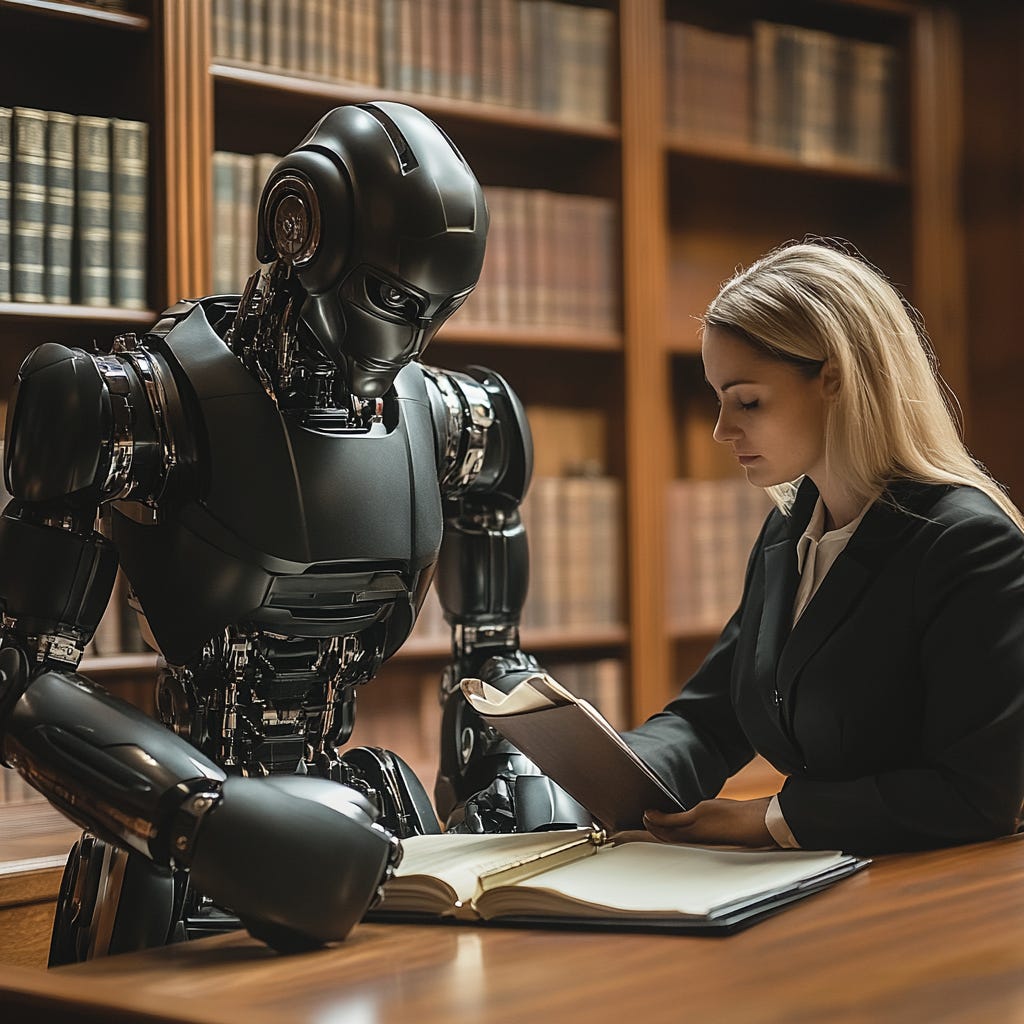
AI in Law: Transforming Legal Practices Today
- AI Adoption in Law Firms: Over 70% of law firms have already adopted AI technologies, leveraging them to improve efficiency, reduce costs, and enhance decision-making, with adoption expected to rise to 90% within a few years. This shift is fundamentally transforming legal operations and client service delivery.
- Theo AI’s Predictive Platform: Theo AI uses advanced machine learning and predictive analytics to help law firms assess case outcomes, allocate resources more effectively, and enhance performance. Its platform has demonstrated reliability, providing data-driven insights that streamline case selection and decision-making processes.
- Future of AI in Legal Practice: AI is poised to revolutionize the legal industry by automating routine tasks and enabling strategic focus on complex decision-making and client relationships. While AI democratizes access to legal services, ethical oversight and human judgment will remain critical to maintaining accountability and transparency in legal practice.
AI’s rapid integration into law firms is no longer a distant possibility; it's already here. Over 70% of law firms have adopted some form of AI technology, with that number expected to soar to 90% within just a few years. This shift is not just about automation; it’s fundamentally changing how legal work is done, enabling firms to drive efficiency, cut costs, and enhance decision-making on a scale previously unimaginable.
This technological transformation is evidenced by real-world applications, such as a top-tier law firm using AI-powered tools to streamline contract reviews, reducing turnaround time from weeks to mere hours. Such developments signal the beginning of an era where AI isn’t just a tool for lawyers—it’s redefining the core functions of legal work and how firms deliver value to their clients.
As AI continues to reshape the legal landscape, it’s becoming clear that law firms are no longer solely defined by their expertise and reputation. The firm that I often work with, DLA Piper, uses tools like Thomson Reuters’ CoCounsel that are enabling firms to offer the most up-to-date, data-driven insights, making it easier to provide clients with the best possible information. These AI-driven tools are pushing firms to embrace technology as a core part of their identity, allowing them to acquire and serve clients in new and innovative ways.
Looking ahead, technology experts like Vinod Khosla predict that AI will surpass human expertise in fields such as law, healthcare, and engineering, making expert knowledge more widely accessible and affordable. This shift will alter how businesses approach their strategies, emphasizing the need for strong relationships and defensible business models. In a world where technologies become commodified, the ability to leverage them effectively, adapt quickly, and maintain strategic advantages will be critical to staying competitive in an ever-evolving landscape.
The Growing Need for Efficiency in the Legal Industry
The legal industry has traditionally relied on time-consuming manual processes, with over 275,000 new lawsuits filed annually in the United States alone. For mid-sized law firms, reviewing and assessing hundreds of cases each year can take between seven and 30 days per case. This labor-intensive process, while necessary, is prone to human error, as legal professionals often rely on intuition and past experience to predict case outcomes, adding a layer of uncertainty to the decision-making process.
AI’s influence on the legal industry is not just about improving efficiency—it’s transforming how firms operate and engage with clients. By providing faster, data-driven insights, AI allows firms to offer more tailored and timely services, enhancing client relationships. AI tools such as chatbots and virtual assistants streamline communication, enabling firms to respond quickly and effectively. However, this shift also raises concerns about job displacement, as AI increasingly takes over repetitive tasks like document review, contract analysis, and legal research, which could alter the roles of paralegals and junior lawyers.
Alongside these operational changes, the use of AI in legal decision-making introduces significant ethical challenges. As AI systems make predictions or provide recommendations, law firms must address concerns about transparency, accountability, and bias. The potential for AI to influence legal outcomes means that human oversight must remain central to the process. Firms must ensure that AI tools are used responsibly, with safeguards in place to prevent harmful consequences stemming from biased or opaque algorithms.
One of my favorite law school professors leads a firm called Theo AI, which is tackling these challenges with a cutting-edge, data-driven platform. By harnessing the power of AI and predictive analytics, Theo AI empowers legal professionals to assess which cases are most likely to yield favorable outcomes. This technology helps firms allocate resources more efficiently, prioritize high-value cases, and ultimately boost their performance by increasing their chances of success.
A Game-Changing Approach to Legal Decision-Making
At the core of Theo AI's platform is its advanced predictive engine, powered by a proprietary data model and machine learning algorithms. These tools are trained on an extensive database of historical case data, allowing the platform to estimate the probability of success for any given case. By analyzing key factors such as case specifics, financial drivers, and past rulings in similar cases, Theo AI provides law firms with valuable insights to inform their decision-making processes.
One of the standout features of Theo AI’s system is its ability to not only predict the likelihood of winning a case but also estimate the potential financial reward. Early users of the platform have found that its predictions align closely with the results of their underwriting and due diligence teams, confirming the system's reliability. This predictive power gives law firms a significant competitive advantage, helping them avoid costly missteps, manage risks, and pinpoint high-potential cases with greater certainty.
Theo AI is far more than a theoretical concept—it’s already generating real-world results for law firms. For instance, a mid-sized firm used Theo AI’s predictive engine to assess the probability of success for a complex corporate litigation case. By examining historical data and identifying key patterns, the platform predicted a high chance of a favorable outcome, prompting the firm to move forward with the case. The firm ultimately won the case and secured a substantial financial reward, providing concrete proof of Theo AI’s predictive accuracy and value.
The success of this case highlights the platform's potential to transform how law firms approach litigation. With Theo AI, firms can make data-driven decisions, minimizing uncertainty and increasing their chances of success. This ability to forecast outcomes with such precision not only improves operational efficiency but also helps law firms build a stronger, more confident approach to the cases they choose to pursue.
Theo AI has proven instrumental in helping law firms streamline their case selection process, enabling them to focus on high-potential cases with the highest chances of success. By leveraging data-driven insights, firms can make smarter, more informed decisions, improving their win rates and optimizing resource allocation. This approach reduces risks and ensures that legal teams invest their time and resources in cases that are most likely to yield positive outcomes.
In an industry where even the most experienced attorneys often rely on educated guesses to predict case outcomes, Theo AI offers a level of certainty and insight that was once unimaginable. By accurately forecasting the likelihood of success, the platform empowers legal teams to make more strategic decisions, ultimately saving time, money, and resources while enhancing overall efficiency.
The Founding Team Behind Theo AI’s Success
The success of any technology-driven venture often hinges on the expertise and vision of its leadership team, and Theo AI is no exception. Co-founded by Alex Alben, a UCLA Law Professor and seasoned tech executive, Patrick Ip, a former Google executive with a background in law, and Tiago Luchini, a four-time CTO and founder with a history of building successful technology companies, the Theo AI team brings together deep expertise in both law and technology.
This unique combination of skills gives Theo AI a competitive advantage, as the team understands both the intricate nuances of legal work and how to apply cutting-edge technology to address industry pain points. Investors have taken notice of this, with Rob Go, Co-Founder and Partner at NextView, praising the company’s ability to develop a platform that reflects the complexities of legal workflows while providing actionable insights to users. Dan Borok, Managing Partner at NVP Capital, also highlights the increasing demand for next-generation B2B tools in the legal sector and positions Theo AI as an ideal solution to meet that need.
Why Predictive Analytics Matters in Legal Practice
Predictive analytics has revolutionized industries such as healthcare, finance, and marketing, where large datasets are used to predict trends and outcomes. However, the legal industry has been slower to adopt these technologies. Traditionally, legal professionals have relied on their experience and intuition to estimate case outcomes, but these methods can be inaccurate and time-consuming.
One of the major advantages of Theo AI is its ability to save valuable time. Instead of spending hours or even days reviewing case files, legal professionals can turn to Theo AI for quick, accurate summaries, key financial drivers, and predictions. This time-saving feature allows lawyers to focus on more strategic, high-value tasks, increasing productivity and the quality of their legal services.
Expanding Applications Across the Legal Industry
Theo AI’s predictive engine has already shown significant promise in predicting case outcomes, but the company plans to broaden its capabilities to other areas of legal work. Beyond forecasting case success, the platform has the potential to identify high-value clients, estimate litigation costs, and streamline case management processes. Its versatility makes it suitable for a wide range of legal practices, from corporate litigation and criminal law to intellectual property disputes.
The expansion of Theo AI’s functionality is set to further enhance law firms' operational efficiency by offering tailored solutions across various practice areas. By providing real-time insights into case progress and potential risks, the platform empowers legal professionals to make more informed decisions, ensuring better resource allocation and management of caseloads.
The Future of AI in the Legal Industry
Theo AI’s successful $2.2 million pre-seed funding round marks a significant milestone for the company and highlights a growing trend within the legal industry. As law firms face increasing pressure to enhance efficiency, reduce costs, and improve results, technology solutions like Theo AI are becoming essential.
With the growing reliance on data-driven decision-making, platforms like Theo AI will play a critical role in reshaping how legal professionals work. By automating and optimizing key processes, Theo AI helps firms remain competitive and efficient in a rapidly changing marketplace.
As the legal field continues to evolve, Theo AI’s platform offers a forward-looking solution for firms seeking to stay ahead of the curve. By embracing AI-driven technology, law firms can improve their operations, reduce risks, and deliver more precise and timely outcomes for their clients. The future of law is likely to be shaped by these technological innovations, with Theo AI leading the way in this transformation.
Conclusion
Theo AI’s introduction of predictive AI to the legal industry represents a groundbreaking shift in how legal professionals evaluate cases, manage resources, and make informed decisions. By harnessing the power of advanced data models and machine learning, the platform provides unprecedented insights into case outcomes, helping firms improve efficiency, reduce risks, and refine their strategies. With a strong leadership team and a clear vision for the future, Theo AI is well-positioned to reshape the legal landscape. As the industry increasingly adopts digital tools and data-driven decision-making, Theo AI’s predictive platform could become an essential asset for law firms looking to navigate the evolving environment with confidence and efficiency.
Looking ahead, the role of AI in law is set to evolve even further, potentially transforming law firms in ways that are still emerging. In the next five to ten years, AI-driven tools are expected to be fully integrated into nearly every facet of legal work—from drafting contracts and conducting legal research to negotiating deals and predicting litigation outcomes. As AI technologies become more advanced, the role of lawyers could shift from routine tasks to focusing on strategic decision-making and fostering client relationships, creating a new dynamic in legal practice.
The growing reliance on AI could also lead to the rise of hybrid lawyer roles—professionals who combine legal expertise with a deep understanding of AI tools to provide value-added services. Moreover, AI has the potential to democratize access to legal services by making high-quality legal advice more affordable and accessible to a broader range of clients, narrowing the gap between large corporate clients and smaller businesses or individuals. This shift could enable law firms to serve a more diverse clientele and expand their reach in the market.
Despite the promising potential of AI in law, it is crucial that human judgment, ethical considerations, and accountability remain central to legal practice as AI takes on more responsibilities. While AI can provide valuable insights and streamline various processes, its implementation must be carefully managed to ensure it complements, rather than replaces, the human elements that make legal services essential. The future of AI in law is full of exciting possibilities, but its successful integration will depend on thoughtful oversight and a balance between technology and the expertise that has traditionally defined the legal profession.
Mr. Mowry is the Managing Partner of Palo Alto Partners and has no direct involvement with Theo AI, aside from having a member of the founding team as a professor at UCLA Law.
He serves as the Chief Investment Officer of a single-family office and an emerging manager, while also supporting other emerging managers through platforms like Coolwater, Kauffman, and in Los Angeles, by connecting them with investors aligned with their fund thesis.








